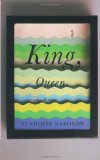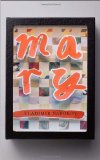Book Review: “King, Queen, Knave” by Vladimir Nabokov
January 25, 2010
Nabokov’s second novel, written in the late 1920′s in Germany, traces the torpid and illusory throes of a love triangle pitting young, mawkish Franz against his rich and boisterous uncle Dreyer. Their joint target: Dreyer’s unattainable, beautiful and manipulative wife.
Ostensibly the characters are German, the novel’s main setting Berlin. But, though sensual, languorous descriptions of rooms and gestures abound, the locale and nationality recedes more or less, and I am reminded of Chekov’s country families or the Russian elite at summer dachas when the Dreyers gather at table during the warmer months of the book.
Franz, just off the turnip truck (or, really, the train into town, on which he coincidentally shares a compartment with none other than his future benefactor and paramour), comes to the big city and begins work as a salesman in his uncle’s department store. It’s only a matter of time before he sets eyes on Dreyer’s wife Martha, and she begins to see him as an innocent, perfect, passionate replacement for her upbeat and stable husband.
Juvenile, vulgar trysts ensue. The intimacy is anatomical, repulsive. Everything has a sexual and creepy tinge, offset by Franz’ obsessive jags of disgust (at smells, at saliva, excrement; though this doesn’t stop him from producing copious amounts of his own) which send him reeling and fleeing. We ourselves want to flee when we’re shut into his damp, grim room with him and Marta during their bouts of rather hideous lovemaking.
The entire book feels like an extreme closeup, showing us the pores and pustules of humans and their delusions. Martha, in her sharp-cornered role of icy temptress exudes her femme fatale nature strongly enough that Franz doesn’t notice for some time that she actually resembles an “old toad.” His early perceptions of her brew perfection from slight flaws: he flies into ecstasy over the fuzz of her upper lip, an unbecoming sweater, a pockmark. As he tires of their affair, we hear his noticing of her “fat thigh” without the embellishment. This spells doom.
Most of the novel is watching Franz and Martha come to the decision that they need to do away with Dreyer to enable their hazy vision of bliss. It’s stupid, of course. A folly.
There is a lot of developing Nabokovian symbolism here, of course. Watch for automatons and hints of the ensuing Nazi threat. Some feels a bit pat in light of Nabokov’s later exquisite works, and KQK falls short of the immediate rapture and brightness of his first work, Mary. What Nabokov does brilliantly here is segue between perception and imagination, stream-of-consciousness, dreams and then back into narrative again—all while, of course, employing taut wordplay—without stumping the reader. It feels natural in flow, especially because this late-1960s translation, a collaboration between Nabokov’s son and the author himself, reworked large pieces of the book to fit better in English, and to reflect changes based on cultural hindsight. The Nazi foreshadowing was increased, and a sentence that caught my eye, that Franz would later be “guilty of worse sins than avunculicide”, added.
The book is worth reading, especially for Nabokov fans. But if you are looking for an entry point or are less committed to untangling the web of the great Russian/French/English writer, read Mary instead.
5 Comments
Get the Book!
Buy the books mentioned in this post from Amazon.com now and help me maintain my rock 'n roll lifestyle.
Related Posts
- Book Review: “The Defense” by Vladimir Nabokov
November 22, 2010 - Book Review: “Mary” by Vladimir Nabokov
December 21, 2009 - Book Review: “The Eye” by Vladimir Nabokov
November 25, 2010 - Book Review: “C” by Tom McCarthy
November 12, 2010 - Book Review: “The Many Deaths of the Firefly Brothers” by Thomas Mullen
January 27, 2010



It seems you have completely misunderstood the book – sadness…
Hi Mikhail,
Could you be more specific about what I missed? Not everyone experiences art the same way.
I think that by identifying the affair as “vulgar” and by suggesting that it’s all Martha’s fault you are missing the general greatness of this book – characters are automatons, playing cards, stereotypes and it’s all a matter of blind fate (even if sometimes it “helps” characters) – domination is never as simple as a “temptress” vs “weakling” here – Martha dominates Franz, Dreyer dominates Martha and Franz, Franz dominates Martha etc etc. The ironic end comes as a shocking surprise and one’s relief at Martha’s death is wonderfully timed as Franz’s own relief. If anyone is delusional in this book, it’s Dreyer who is clueless and doesn’t know it (or care) – Martha and Franz are extremely pragmatic (even if foolish) in their planning and execution. Most of the novel is not about their decision to kill Dreyer – they decide to do it early on – but about sheer impossibility of making any decision: Dreyer is the decider and yet even he only does it on a whim (cf. inventor side-story).
In any case, your review seemed to me as though you were not very impressed or moved by the book, thus the sad conclusion, but you’re right, not everyone experiences things the same way which means whatever you conclusion or my conclusion was, they are all correct…
I think that the novel’s best quality is that it allows for several different possible realities depending on which character you find more reliable or which “truth” seems the most viable. The viewpoint I chose to latch onto involves the following: Dreyer is not as much an idiot lout as Martha projects and that the Martha-Franz relationship is viewed by Martha and Franz as deeply meaningful but in fact is nothing more than a fatuous romp. But that Martha is indeed manipulative and piercing, at least in Franz’s and Dreyer’s worlds.
You are right about my mistaken expression about one thing, certainly: the decision to kill Dreyer isn’t a twist whatsoever; it’s pretty clearly the direction things are going from early on in Martha and Franz’s affair. The inventor-automaton symbolism does indeed imply (at least to me) that Franz and Martha are on a feckless trajectory that they are at least on some level powerless to control. My dislikes for this book are relative: I’m trying to get through Nabokov’s entire catalog, and KQK, while certainly stellar when held up against an average book, pales against some of Nabokov’s other works (for me–this is of course all opinion).
I don’t think Martha thinks Dreyer is an idiot – that’s precisely her problem in the novel, that is, she doesn’t really know what to make of her husband – he’s clearly the liveliest and most energetic character in the novel, even if sometimes cruel due to his tendency to get bored and move on. He is at least living through his passions (having wealth helps), Martha/Franz are clearly pragmatic calculative types – they thinks they need love/wealth and their only quick way is through murder.
Maybe the problem is that you’re reading the later re-worked version in English, and I’m reading the Russian. Still, I think one cannot dismiss the affair as something insignificant, even if it is only there to show us the larger more problematic aspect of any life: unpredictable and therefore funny side of chaos/irony..